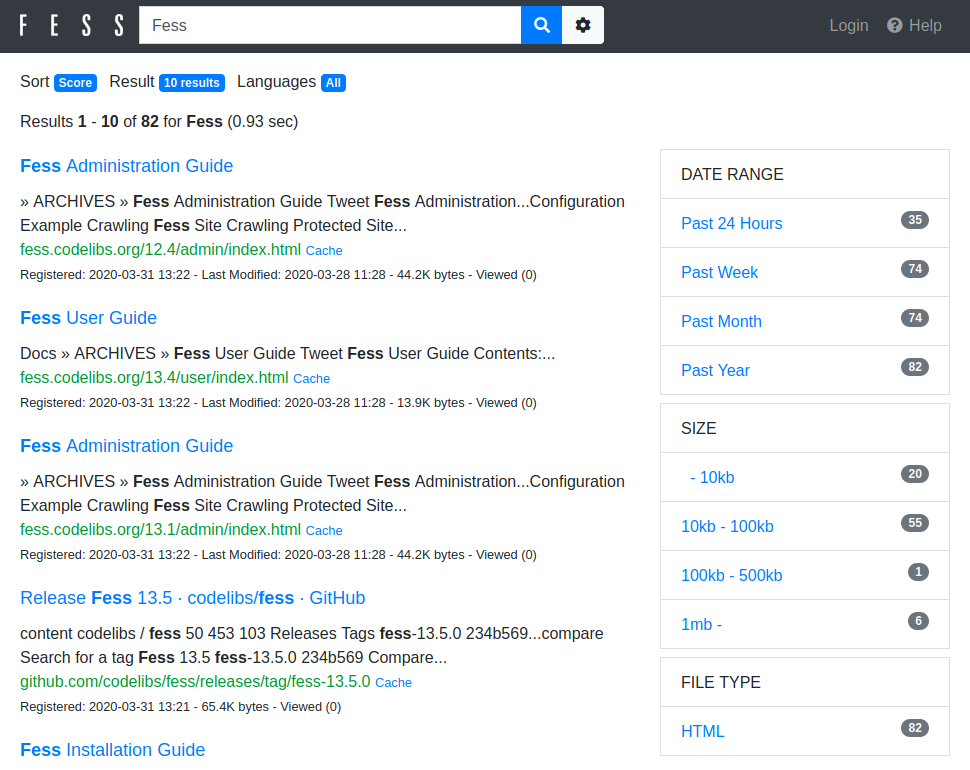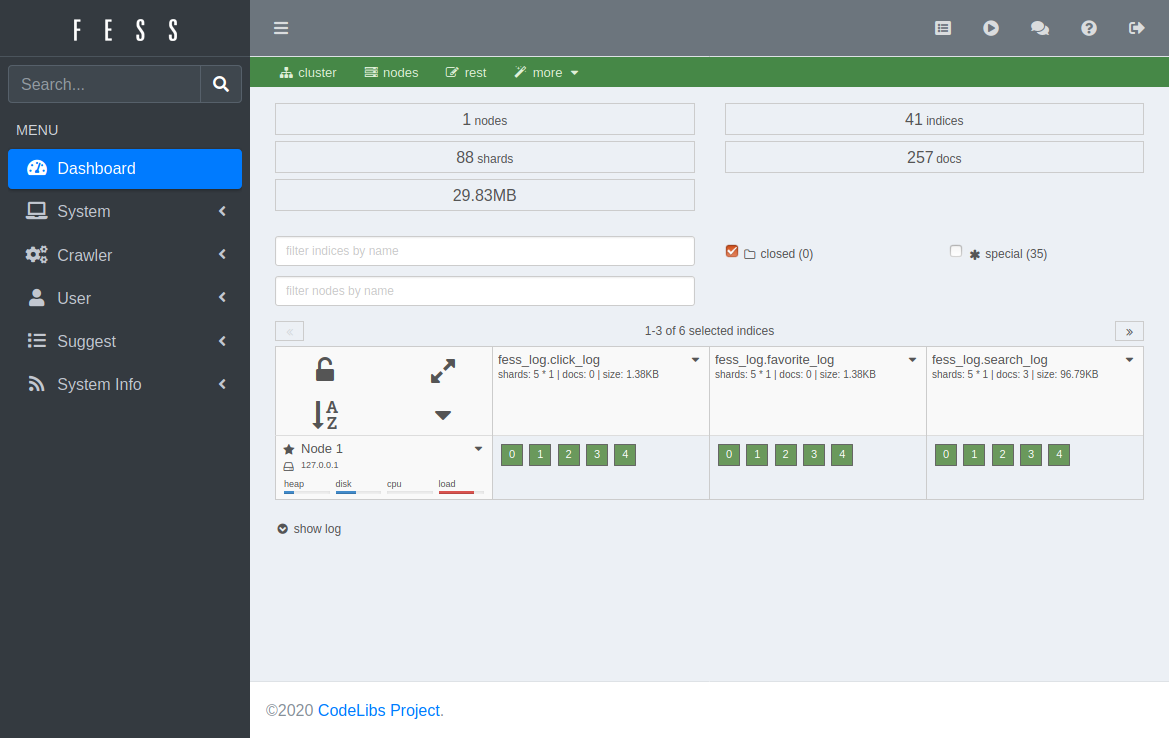- Sort Score
- Result 10 results
- Languages All
Results 1 - 10 of 18 for LOCALHOST (1.6 sec)
-
CLAUDE.md
mvn test -P integrationTests -Dtest.fess.url="http://localhost:8080" -Dtest.search_engine.url="http://localhost:9201" # Run single integration test mvn test -P integrationTests -Dtest.fess.url="http://localhost:8080" -Dtest.search_engine.url="http://localhost:9201" -Dtest=SearchApiTests ``` ### Running ```bash # From IDE: Run main method in org.codelibs.fess.FessBoot # Access at: http://localhost:8080/
Registered: Sat Dec 20 09:19:18 UTC 2025 - Last Modified: Fri Nov 28 16:29:12 UTC 2025 - 4.8K bytes - Viewed (0) -
README.md
### Browser UI - Search UI: http://localhost:8080/  - Admin UI: http://localhost:8080/admin/ (default username/password is admin/admin) 
Registered: Sat Dec 20 09:19:18 UTC 2025 - Last Modified: Sat Dec 20 00:28:33 UTC 2025 - 7.8K bytes - Viewed (2) -
src/main/java/org/codelibs/fess/mylasta/direction/FessEnv.java
/** The key of the configuration. e.g. localhost:25 */ String MAIL_SMTP_SERVER_MAIN_HOST_AND_PORT = "mail.smtp.server.main.host.and.port"; /** The key of the configuration. e.g. [Test] */ String MAIL_SUBJECT_TEST_PREFIX = "mail.subject.test.prefix"; /** The key of the configuration. e.g. root@localhost */ String MAIL_RETURN_PATH = "mail.return.path"; /**Registered: Sat Dec 20 09:19:18 UTC 2025 - Last Modified: Thu Nov 27 07:01:25 UTC 2025 - 9.9K bytes - Viewed (0) -
fess-crawler/src/test/java/org/codelibs/fess/crawler/client/ftp/FtpClientTest.java
assertEquals("ftp://localhost:10021/text 3.txt", urlList.get(2)); assertEquals("ftp://localhost:10021/text1.txt", urlList.get(3)); assertEquals("ftp://localhost:10021/text2.txt", urlList.get(4)); } finally { if (server != null) { server.stop(); } } }
Registered: Sat Dec 20 11:21:39 UTC 2025 - Last Modified: Mon Nov 24 03:59:47 UTC 2025 - 21.5K bytes - Viewed (0) -
src/main/java/org/codelibs/fess/job/ExecJob.java
/** * Enables remote debugging for this job execution. * Adds JVM options for remote debugging on localhost:8000. * * @return this ExecJob instance for method chaining */ public ExecJob remoteDebug() { return jvmOptions("-Xdebug", "-Xrunjdwp:transport=dt_socket,server=y,suspend=y,address=localhost:8000"); } /** * Enables garbage collection logging for this job execution.Registered: Sat Dec 20 09:19:18 UTC 2025 - Last Modified: Fri Nov 28 16:29:12 UTC 2025 - 14.2K bytes - Viewed (0) -
src/main/assemblies/files/fess.in.sh
FESS_MAX_MEM=2g fi if [ "x$FESS_HEAP_SIZE" != "x" ]; then FESS_MIN_MEM=$FESS_HEAP_SIZE FESS_MAX_MEM=$FESS_HEAP_SIZE fi # External opensearch cluster #SEARCH_ENGINE_HTTP_URL=http://localhost:9200 #FESS_DICTIONARY_PATH=/var/lib/opensearch/config/ # SSL truststore for certificate validation over https #FESS_JAVA_OPTS="$FESS_JAVA_OPTS -Djavax.net.ssl.trustStore=/tech/elastic/config/truststore.jks"
Registered: Sat Dec 20 09:19:18 UTC 2025 - Last Modified: Thu Nov 27 03:48:59 UTC 2025 - 5.3K bytes - Viewed (0) -
src/main/assemblies/files/fess.in.bat
set FESS_JAVA_OPTS=%FESS_JAVA_OPTS% -Dtomcat.config.path=tomcat_config.properties REM External opensearch cluster REM set FESS_JAVA_OPTS=%FESS_JAVA_OPTS% -Dfess.search_engine.http_address=http://localhost:9200 REM set FESS_JAVA_OPTS=%FESS_JAVA_OPTS% -Dfess.dictionary.path=%SEARCH_ENGINE_HOME%/config/
Registered: Sat Dec 20 09:19:18 UTC 2025 - Last Modified: Thu Nov 27 03:48:59 UTC 2025 - 4.8K bytes - Viewed (0) -
src/main/java/org/codelibs/fess/sso/spnego/SpnegoAuthenticator.java
protected static final String SPNEGO_ALLOW_DELEGATION = "spnego.allow.delegation"; /** Configuration key for allowing localhost authentication bypass. */ protected static final String SPNEGO_ALLOW_LOCALHOST = "spnego.allow.localhost"; /** Configuration key for prompting NTLM authentication. */ protected static final String SPNEGO_PROMPT_NTLM = "spnego.prompt.ntlm";
Registered: Sat Dec 20 09:19:18 UTC 2025 - Last Modified: Fri Nov 28 16:29:12 UTC 2025 - 17.8K bytes - Viewed (3) -
src/main/java/org/codelibs/fess/sso/oic/OpenIdConnectAuthenticator.java
} /** * Builds a default redirect URL for OpenID Connect based on the environment. * Uses the configured base URL or defaults to http://localhost:8080 for compatibility * with common OIDC provider configurations. * * @return the default redirect URL */ protected String buildDefaultRedirectUrl() {Registered: Sat Dec 20 09:19:18 UTC 2025 - Last Modified: Sun Dec 14 01:18:25 UTC 2025 - 16.5K bytes - Viewed (0) -
src/main/java/org/codelibs/fess/sso/saml/SamlAuthenticator.java
* saml.idp.x509cert=MIIDqjCCApKgAwIBAgIGAYMwfYAwMA0G... * </pre> * * <h2>Service Provider URL Configuration</h2> * <p>By default, the SP URLs use {@code http://localhost:8080} as the base URL. * For production or when the IdP is configured with a different URL, you should * set one of the following:</p> * * <h3>Option 1: Set base URL (recommended for simplicity)</h3> * <pre>
Registered: Sat Dec 20 09:19:18 UTC 2025 - Last Modified: Sun Dec 14 01:18:25 UTC 2025 - 20.2K bytes - Viewed (3)